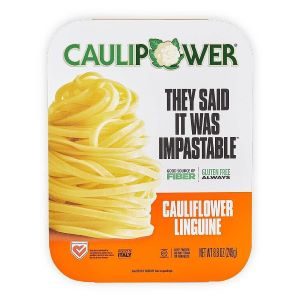Share this Handy Vegan Diets in a Nutshell Poster
Share this handy poster with family and friends. You can also print it out and post it on your refrigerator. See: https://www.vrg.org/nutshell/VeganDietsinaNutshellPoster.pdf
Share this handy poster with family and friends. You can also print it out and post it on your refrigerator. See: https://www.vrg.org/nutshell/VeganDietsinaNutshellPoster.pdf
 The latest issue of Vegan Journal includes a review of Caulipower’s Linguine and Papparadelle. These products come from the freezer case and cook up perfectly in boiling water in only three minutes.
The latest issue of Vegan Journal includes a review of Caulipower’s Linguine and Papparadelle. These products come from the freezer case and cook up perfectly in boiling water in only three minutes.
Read the entire review here: https://www.vrg.org/journal/vj2022issue3/2022_issue3_veggie_bits.php
Subscribe to Vegan Journal: https://www.vrg.org/party/
Dr. John Westerdahl, President of the Adventist Nutrition and Dietetics International Association (ANDIA) announced a free upcoming webinar series on Plant-Based Diets for Better Health. The first webinar in this series is “Cruciferous Vegetables for Fighting Cancer”, which will be presented by Dr. Emily Ho, on September 11, 2022, at 6 PM Eastern See information at https://drive.google.com/file/d/1ZS1eCvLqAjnmjrB1GOG7yxNVNkPAnyif/view?usp=sharing
All have worked tirelessly to compile this cookbook with one vision, to minimize violence against all living beings. Its publication is also a humble effort to realize the dream of Gurudev Shree Chitrabhanu on his 100th birth anniversary. Their goal is to ensure that every Jain family in North America has this cookbook to further progress on the path of achieving non-violence toward all living beings.
In the latest issue of Vegan Journal, Amy Burger reviews the book California Vegan, by Sharon Palmer, RD. Amy says, “California Vegan, like the recipes it features, is bright, fresh, and inspired by the state itself. While California’s myriad cultural influences and distinct regions are the themes of its chapters, the unifying thread is an emphasis on fresh, seasonal produce. Palmer’s health conscious recipes are easy to follow and are accompanied by beautiful photographs.
Read the entire review here: https://www.vrg.org/journal/vj2022issue3/2022_issue3_book_reviews.php
Subscribe to Vegan Journal: https://www.vrg.org/party/
What can you pack for a vegan lunch? Whether you’re going to school, work, a picnic, or on a road trip, you need options for lunch. Check out 50 ideas to fill your lunch bag!
See this Vegetarian Resource Group Video at https://youtu.be/kqoFDjQO2fs
More videos at:
https://www.youtube.com/channel/UCvSyCToa_i9fA4D5CLCAFWw
https://www.vrg.org/veg_videos.php
Hiking, walking, and camping are great ways to get outside, enjoy nature, and unwind from your day-to-day life. We’ve got all the info you need to put together your own sweet or savory trails mixes, make vegan homemade oatmeal bars, and more. These ideas are great for the outdoors or car trips or even just to keep handy for snacking.
See this short video at https://youtu.be/IpYVzxt7OKQ
Recipe for Cherry Ginger Oat Bars: https://www.vrg.org/blog/2022/02/18/cherry-lime-ginger-oat-bars/
Vegan Hiking Boot Guide: https://www.vrg.org/blog/2022/03/10/vegan-hiking-boots-sold-online-in-the-usa-canada-and-europe/
Recipe for Homemade Trail Mixes: https://www.vrg.org/blog/2022/02/16/trail-mixes/
Vegan Hiking On the Appalachian Trail: https://www.vrg.org/blog/2020/01/29/hiking-while-vegan/
The contents of this website and our other publications, including Vegetarian Journal and Vegan Journal, are not intended to provide personal medical advice. Medical advice should be obtained from a qualified health professional. We often depend on product and ingredient information from company statements. It is impossible to be 100% sure about a statement, info can change, people have different views, and mistakes can be made. Please use your best judgment about whether a product is suitable for you. To be sure, do further research or confirmation on your own.
The Vegetarian Resource Group has been home to numerous interns each year. They range from Middle and High School students to College and Graduate Students. The interns have varied interests and we strive to assign them projects that will help them in their careers. Here’s an article describing what some former VRG interns are doing today: https://www.vrg.org/journal/vj2022issue3/2022_issue3_past_interns.php
To support VRG’s internship programs, donate at www.vrg.org/donate
By Cierra Peterlin, RD, VRG volunteer
Recently I decided to relocate from the Philadelphia, PA area to San Diego, CA. I’d like to highlight some of the awesome eats I came across on my journey from eastern to western USA.
Southwest Salad with pulled seitan. Sauces: salsa and chipotle aioli
Chickpea Salad Sandwich
High Fives with agave mustard and mac and cheese
Greens and Grains Bowl
Buddha Bowl with tofu
Lunch Bowl
To find a list of veggie restaurants in the USA and Canada visit: https://www.vrg.org/restaurant/index.php
The latest issue of Vegan Journal includes a review of Zellee Fruit and Sports Jels. These jels have all the texture of gelatin but with none of the animal products, and they come in easy-to-use pouches that won’t make a mess of your desk drawer or gym bag.
Read the entire review here: https://www.vrg.org/journal/vj2022issue3/2022_issue3_veggie_bits.php
Subscribe to Vegan Journal: https://www.vrg.org/party/

Join The VRG with $35 via our subscription form, and receive the Vegan Journal for two years and a copy of Simply Vegan!
The Vegetarian Resource Group (VRG) is a non-profit organization dedicated to educating the public on veganism and the interrelated issues of health, nutrition, ecology, ethics, and world hunger. We have been helping health professionals, food services, businesses, educators, students, vegans, and vegetarians since 1982. In addition to publishing the Vegan Journal, VRG produces and sells a number of books.
Sign up for our newsletter to receive recipes, ingredient information, reviews of new products, announcements of new books, free samples of products, and other VRG materials.